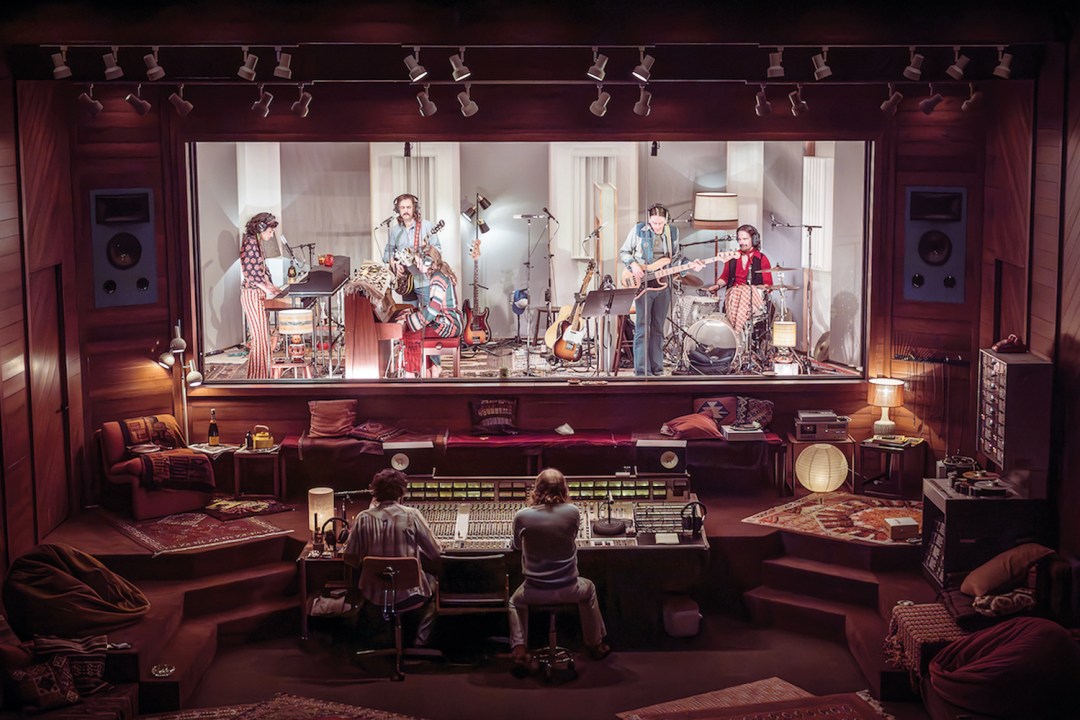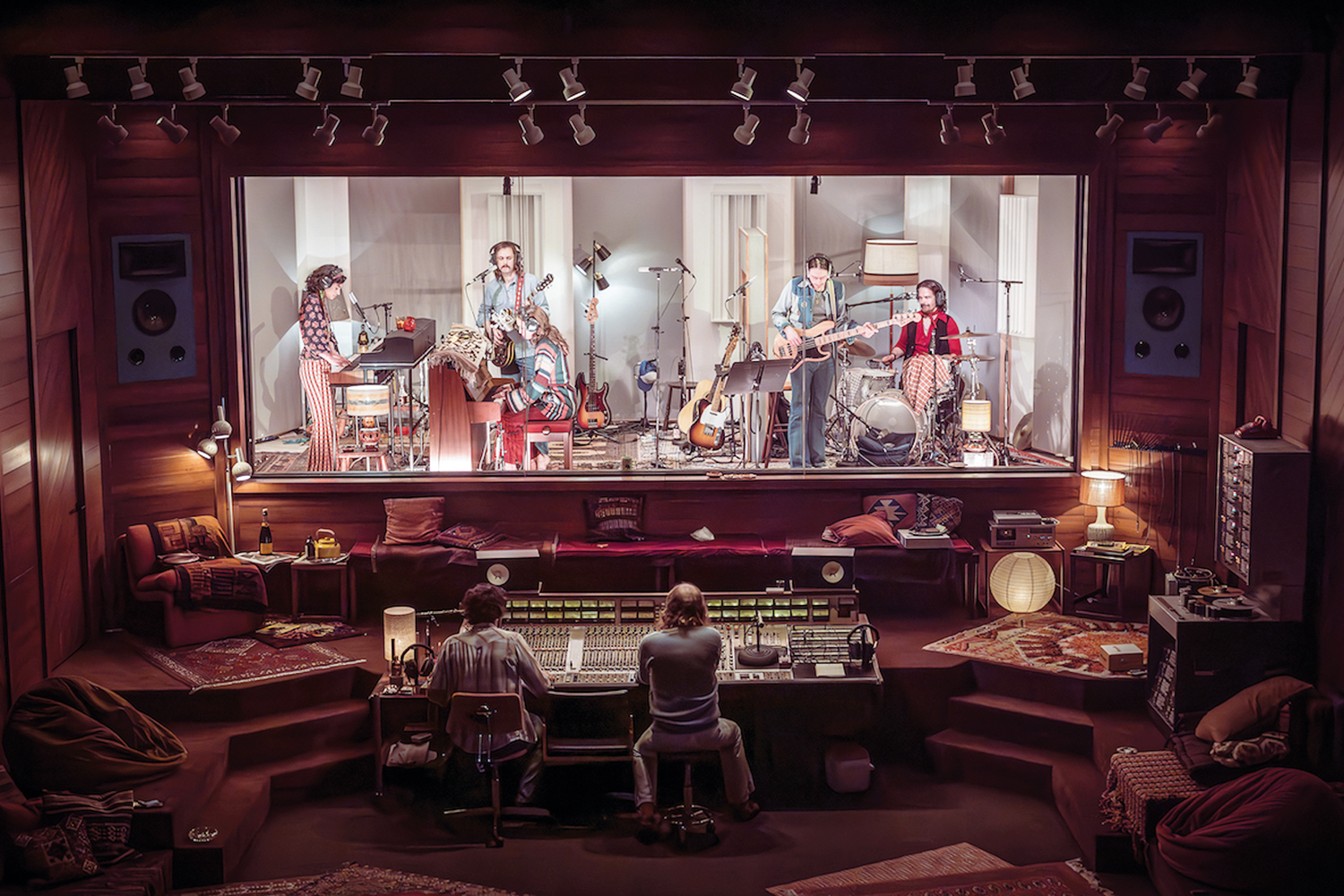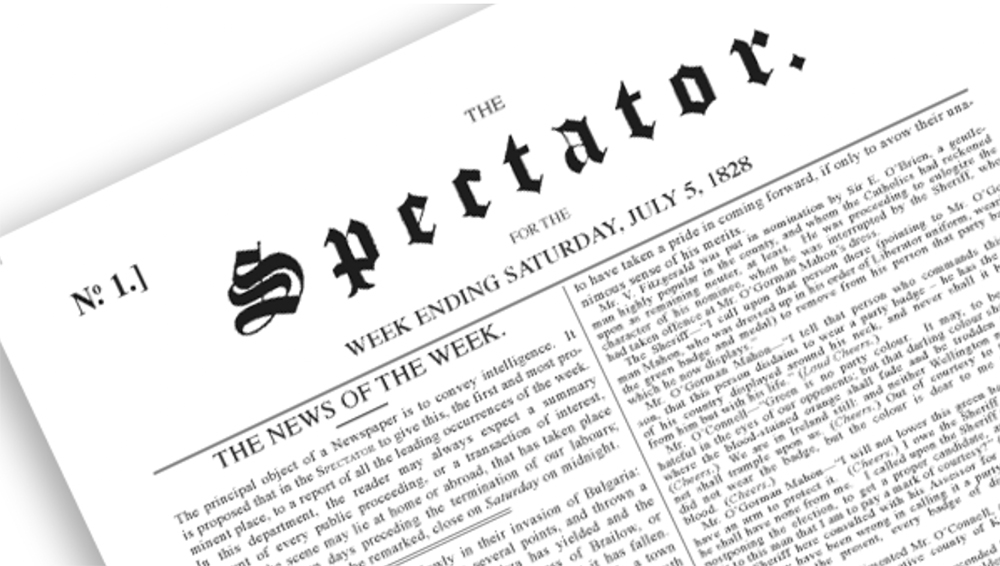
Stereophonic is a slow-burning drama set in an American recording studio in 1976. A collection of hugely successful musicians, loosely based on Fleetwood Mac, are working on a new album which they hope will match the success of their previous number one smash.
This is an absolute treat for anyone who appreciates subtle, oblique and quietly daring theatre
The studio could almost be an orphanage because the characters keep squabbling and bickering like siblings in need of a parent. The self-appointed leader is Peter (Jack Riddiford) who dresses in classic hippy mode with a kaleidoscopic shirt and a droopy moustache. But he rules the studio with a rod of iron. He asks the nerdy engineer, Grover, to spare him ten minutes to record a guitar solo but they end up working on it for ten hours. And still Peter isn’t happy. The more effort he puts into the album the more hostility he attracts from the other musicians who dislike his control freakery. Tensions mount. Hatred erupts. Love curdles as well. Peter’s affair with the lead singer, Diana, is falling to pieces and their difficulties culminate in an exquisitely painful scene. Standing at a single mike, they record a backing track while trading vicious insults. ‘I find you physically repulsive,’ says Diana, in a short pause between takes. ‘I’d like to set fire to your hair,’ replies Peter. But when they sing they create a heavenly sweetness. The point is well made. Bitter feuds can inspire great art.
The writer, David Adjmi, elaborates the script like a many-stranded documentary and he hides the emotional weight of each scene in a minor gesture or informal detail. He creates side plots that flare up and fade away inexplicably. And he includes awkward moments of flirtation that lead to nothing in particular. Just like real life. The show is a series of gossipy little mysteries as a well as a pin-sharp analysis of a band in the throes of a terminal meltdown. Great performances all round.
The most likeable character is Reg (Zachary Hart) whom everyone regards as an emotional cripple. His breakfast tipple is Jack Daniels and he snorts coke from a massive stash that gets passed around the studio like a bag of dolly mixtures. His frustrated girlfriend, Holly, orders him to sober up. And he does, miraculously. But not for long. Nia Towle (Holly) is the cornerstone of the group. A sweet, dependable charmer loved by everyone. But then she learns that Diana has signed a solo deal with Columbia – and she changes. Andrew R. Butler does heroic work as an assistant engineer, Charles, who has so little impact on the studio that his name remains unknown to every member of the band. A terrific running gag. His cameo performance completes the sense of richness and naturalism that distinguish this superb show.
The handsome costumes and hairdos are great to look at, and authentic in every detail. No hint of parody or pastiche. The lighting and the sets are more than exquisite. They’re calming and soothing. Relaxing even. That matters because the show lasts 200 minutes.
This is an absolute treat for anyone who appreciates subtle, oblique and quietly daring theatre that uses silence as a player in the drama. There are empty moments here where nothing is happening and everything is happening. If you get it, you’ll love it.
Marriage Material is a version of Cinderella set in the Sikh community in the 1970s. Surinder is an ambitious, intelligent teenager whose parents prevent her from studying and force her to work long hours in their corner shop. The family is dominated by Surinder’s violent, illiterate mother who hopes to marry her off to a randy young groom from an even more repressive clan of Sikhs. When a charming white boy asks her to join him for a knickerbocker glory, she sees her chance to escape.

The production, based on a novel by Sathnam Sangera, addresses some of the social problems faced by Sikhs in Britain. Many of them are self-inflicted. The intolerant characters refer to white people in derisive language but they seem shocked and offended when white people reciprocate. The males campaign vociferously for their ‘right’ to wear a turban at work, and yet they leave their heads uncovered at home and in the street. They refuse to wear turbans even at a pro-turban rally. Strange behaviour. Why agitate for a privilege they have no wish to enjoy?
The source of their bigotry is Surinder’s father who broods angrily and obsessively over the British Raj. He refers to England as a ‘disease’ and he makes it clear that he has little interest in co-existing with his white neighbours. Surinder is the only enlightened and tolerant member of the family and when she breaks free of their cruel insularity, she finds wealth, power and independence. This enrages her relatives who jeer at her ‘English’ persona. By ‘English’ they mean ‘successful’. Perhaps they don’t know what they’re saying.









Comments